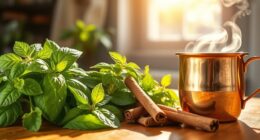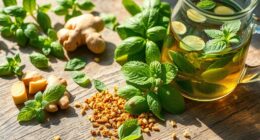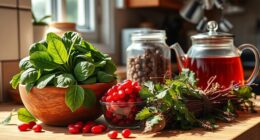Herbology, a blend of traditional practices and scientific findings, offers a holistic approach to healthcare. Ancient cultures have influenced herbal medicine, with documentation of methodologies and herb effects enhancing understanding. Herbology's potential to complement healthcare has sparked scrutiny, highlighting its value. Bioactive compounds in herbs, such as flavonoids and alkaloids, exhibit anti-inflammatory and antioxidant properties, driving the efficacy of herbal treatments. As scientific inquiry validates the effectiveness of herbal remedies, integration with modern medicine becomes a promising approach. With a deeper exploration of herbology's possibilities, the full potential of nature's healing powers can be uncovered, shedding light on a broader understanding of health and wellness.
Key Takeaways
• Herbology combines traditional practices and scientific findings to offer holistic healthcare solutions, bridging the gap between ancient wisdom and modern medicine.
• Bioactive compounds in herbs, such as flavonoids and alkaloids, exhibit anti-inflammatory, antioxidant, and antimicrobial properties, driving the efficacy of herbal treatments.
• Scientific validation of herbal remedies through clinical trials and studies enhances the credibility of herbal medicine, informing traditional practices with evidence-based findings.
• Integrating herbology with modern medicine enables tailored treatment plans, combining the strengths of both disciplines to provide a thorough understanding of health and wellness.
• However, herbology also poses challenges, such as lack of standardized dosages, potential adverse reactions, and contamination risks, emphasizing the need for consultation with healthcare providers.
Fundamentals of Nature's Healing
As the intersection of nature's bounty and human health needs, herbology has evolved over centuries, drawing from traditional practices and scientific findings to form a rich knowledge base that informs its workings.
With roots in ancient cultures, including Chinese, Indian, Egyptian, and Greek traditions, herbal medicine has developed over time. Documentation of methodologies and herb effects has contributed to a thorough understanding of herbology.
As modern medicine continues to evolve, the efficacy of herbology is being scrutinized, prompting a re-examination of its role in healthcare. This scrutiny has led to a greater understanding of the complexities of herbology, highlighting its potential to complement modern medicine and provide holistic healthcare solutions.
Unlocking Active Compounds

Beyond the cultural and historical significance of herbology lies a complex array of bioactive compounds, which form the foundation of herbal medicine's therapeutic potential. These compounds, including flavonoids, alkaloids, and terpenes, exhibit anti-inflammatory, antioxidant, and antimicrobial properties. The following table highlights some examples of active compounds and their effects:
| Compound | Source | Effects |
|---|---|---|
| Curcumin | Turmeric | Anti-inflammatory, antioxidant |
| Quercetin | Apples, onions | Anti-inflammatory, antioxidant |
| Gingerol | Ginger | Anti-inflammatory, digestive aid |
| Silymarin | Milk thistle | Antioxidant, liver protection |
| Ginsenosides | Ginseng | Antioxidant, adaptogenic |
These bioactive compounds drive the efficacy of herbal treatments, offering potential benefits for various health conditions. By understanding the active compounds present in herbs, we can tap into the full potential of herbal medicine.
Scientific Validation of Herbs
Through rigorous scientific inquiry, the efficacy of herbal remedies is being systematically evaluated, shedding light on the validity of traditional practices and informing the development of evidence-based herbal medicine.
Studies have validated the efficacy of specific herbs, such as echinacea, which strengthens the immune system and reduces cold symptoms. While promising studies exist, more rigorous clinical trials are often necessary to corroborate findings.
Scientific scrutiny is essential to answer the question of herbology's effectiveness. By subjecting herbal remedies to rigorous testing, researchers can identify the most effective treatments and optimize their use.
This evidence-based approach will ultimately enhance the credibility and reliability of herbal medicine.
Integrating Herbology With Medicine

In recognition of the complementary strengths of both disciplines, the fusion of herbology and modern medicine offers a holistic approach to healthcare. The empirical wisdom of herbal remedies is combined with the scientific rigor of conventional medicine, enabling a more thorough understanding of health and wellness. This integration allows healthcare providers to tailor treatment plans that address the unique needs of each patient.
Challenges in Herbal Healing
Despite the promising potential of herbal remedies, several challenges and considerations must be acknowledged to guarantee safe and effective use.
One major concern is the lack of standardized dosages, which can lead to adverse reactions. Misuse or overconsumption of herbal remedies can also result in negative interactions with conventional medications.
Additionally, not all herbal products are free of contaminants or adulterants, which can compromise their quality and safety.
It is essential to consult healthcare providers before using herbal remedies, especially for individuals with pre-existing medical conditions or taking prescription medications. Professional guidance is essential to ensure the safe and effective integration of herbal remedies into healthcare regimens.
Frequently Asked Questions
Can Herbology Be Used to Treat Mental Health Conditions Like Anxiety and Depression?
Research suggests that herbology may offer potential therapeutic benefits for mental health conditions like anxiety and depression. Certain herbs, such as passionflower and kava, have been traditionally used to calm the mind and reduce anxiety symptoms.
Some studies have demonstrated the anxiolytic effects of herbal remedies, including St. John's Wort and S-adenosylmethionine (SAMe). However, more rigorous clinical trials are needed to fully understand the efficacy and safety of herbal treatments for mental health conditions.
How Does Herbology Approach the Treatment of Chronic Diseases Like Diabetes?
Herbology approaches chronic diseases like diabetes by leveraging botanicals with scientifically-backed properties. For instance, Gymnema sylvestre has been shown to reduce blood sugar levels, while Berberine-rich plants exhibit insulin-sensitizing effects.
Herbal remedies can complement conventional treatments, improving glucose metabolism and insulin sensitivity. A holistic approach, combining herbal therapies with lifestyle modifications and medication, may help manage diabetes and mitigate its complications.
Further research is necessary to fully understand the potential of herbology in diabetes treatment.
Are There Any Herbal Remedies That Can Help With Skincare and Beauty Routines?
The efficacy of herbal remedies in skincare and beauty routines is rooted in the bioactive compounds found in plants. For instance, aloe vera's anti-inflammatory properties soothe skin irritations, while chamomile's antioxidant properties calm skin and reduce inflammation.
Turmeric's curcumin exhibits antiseptic and antibacterial properties, making it effective in treating acne. These herbal remedies, when used correctly, can provide natural and effective solutions for various skin concerns, enhancing overall beauty and well-being.
Can Herbal Supplements Interact With Prescription Medications?
Herbal supplements can interact with prescription medications, posing potential risks to health. Active compounds in herbs can alter the metabolism or absorption of medications, leading to adverse effects or reduced efficacy.
For instance, St. John's Wort can decrease the effectiveness of blood thinners, while ginkgo biloba can increase the risk of bleeding when taken with anticoagulants.
It is crucial to consult a healthcare professional before combining herbal supplements with prescription medications to guarantee safe and effective treatment.
What Is the Role of Diet and Nutrition in Herbal Medicine Practices?
As the old adage goes, 'you are what you eat,' and in herbal medicine, diet and nutrition play a holistic role in optimizing treatment outcomes.
A well-balanced diet rich in whole foods, fruits, and vegetables enhances the bioavailability and efficacy of herbal remedies. Conversely, a poor diet can hinder the absorption of active compounds, rendering herbal treatments less effective.
A thorough approach to herbal medicine, hence, must consider the intricate relationship between diet, nutrition, and herbal supplements.
Conclusion
To sum up, the vast expanse of herbology's potential has merely been scratched, with a treasure trove of natural remedies waiting to be unearthed.
As the scientific community continues to validate the efficacy of herbal medicine, the possibilities for innovative healthcare solutions are endless.
By integrating the ancient wisdom of herbology with modern medicine, the future of healthcare holds unprecedented promise, with the potential to revolutionize treatment paradigms and transform human health.










